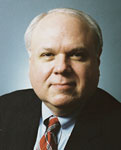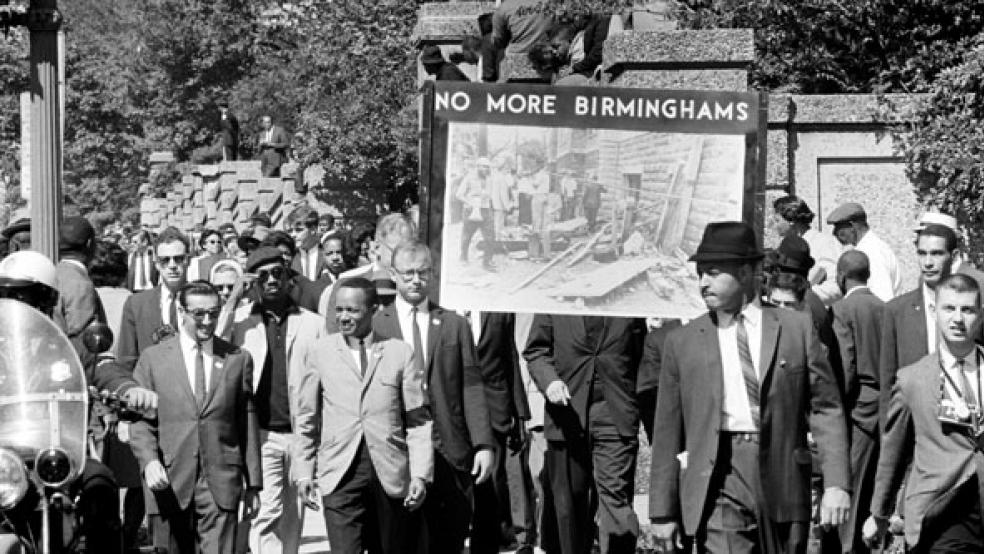Despite all the remembrances of Dr. Martin Luther King Jr. this week on the 50th anniversary of the 1963 March on Washington, I think his true accomplishment still remains largely  underappreciated. It wasn’t his goals that were so important—those were widely shared—it was his methods that were critical to his leadership and the success of the civil rights movement.
underappreciated. It wasn’t his goals that were so important—those were widely shared—it was his methods that were critical to his leadership and the success of the civil rights movement.
Slavery and racial segregation were brutal institutions. Obviously so in the former, but equally so in the latter. Those violating racial norms in the South, where blacks, especially males, were expected to know their place and stay in it, were often subjected to torture of various kinds and lynching was common well into the 1960s.
This being the case, it would have been reasonable for African Americans to conclude that ending violent policies and institutions required violence. After all, it was only the extreme violence of the Civil War that ended slavery. Those who think it could have been destroyed peacefully are extraordinarily naïve.
RELATED: FOR TWO FEW, DR. KING'S DREAM HAS BECOME REALITY
A key reason why even non-slave-owning Southerners gave their lives to defend slavery—which was the only cause of the war, contrary to racist propaganda that it was about tariffs or some other nonsense—is that almost all black people lived in the South at that time and greatly outnumbered whites in most places.
Whites of all social classes were scared to death of what might happen to them if millions of slaves were suddenly given their freedom.
Southern whites had every reason to think that the former slaves would retaliate against them for generations of brutality. That is why they moved as quickly as possible after the war to institutionalize racial segregation, keep blacks down and subservient to the white power structure.
This was accomplished through various means—denying African-Americans the right to vote, prohibiting them from joining labor unions and utilizing their skills, providing only minimal education in all-black schools, arresting black males for trumped-up offenses such as vagrancy and then renting out their labor through chain gangs that were as bad or worse than slavery, refusing them services at white establishments and many other actions both petty and coercive. And of course there was the Ku Klux Klan and other paramilitary organizations that enforced white justice against nonconforming blacks in the dead of night.
It’s important to remember that this is not ancient history; these social mores lasted well into the lifetimes of many people still alive. There is no evidence whatsoever that in the century between the Civil War and the beginning of the civil rights movement in the 1950s that the free market did anything whatsoever to break down segregation in the South, as many libertarians foolishly believe.
And remember that the South was virtually a libertarian paradise in those days—with minuscule taxes, no labor unions and virtually nonexistent government except for plenty of law enforcement to guarantee the sanctity of contracts, maintain the peace and protect the “free market.”
RELATED: 14 AFRICAN AMERICANS WHO CHANGED HISTORY
When the civil rights movement really got going in 1955 with the Montgomery bus boycott, there was every reason to believe that the racist power structure would crush it with the most extreme prejudice imaginable. If African Americans had responded in kind, with violence, their blood would have flowed freely throughout the South. The awfulness of that likelihood is too terrible to contemplate.
It is quite possible that the entire South could have ended up like much of the Middle East today, with blacks using the same tactics used by the Palestinians and Muslim terrorists—suicide bombings, armed revolution, assassinations and so on.
There is only one reason why this didn’t happen—Dr. King. He had studied the methods Mahatma Gandhi used in both India and South Africa to bring about social change through nonviolence, and he resolved to use the same methods in the civil rights struggle.
It is hard to convey just how radical Dr. King’s strategy was. Those who suffer from violent repression naturally want to respond in kind and they want action yesterday, not tomorrow and certainly not in the distant future. Nonviolence seems like a strategy for wimps, passivity equals cowardice, many naturally believe.
But Dr. King understood that nonviolence is an extraordinarily powerful method of bringing about radical social change; far more powerful than violence, which tends to beget violence infinitely. It works by harnessing the power of morality, working on the consciences of one’s oppressors and others in their class, encouraging allies to join their cause, and letting time and patience wear down one’s enemies like dripping water on a rock.
The really big problem with a nonviolence strategy is that is needs to be comprehensive to work; a few hotheads who take matters into their own hands can set back the entire movement, undo all its progress in a matter of moments. Convincing everyone in the civil rights movement to follow his nonviolence strategy was Dr. King’s greatest accomplishment, one that was truly extraordinary and still underappreciated.
If one reads books about Dr. King, such as those by the historian Taylor Branch, it will be seen that a vast amount of his time was spent on the phone and meeting with impatient followers dissatisfied with the slow pace of his strategy. They wanted an end to segregation immediately and thought violence was justified against racist cops and other agents of oppression.
Dr. King’s persuasiveness must have been incredible because he was successful. And although nonviolence seemed like a long-term strategy, in fact it worked remarkably fast. The Montgomery bus boycott started on December 1, 1955, and the Civil Rights Act of 1964 was signed into law less than 10 years later on July 2, 1964. That’s lightning speed by the standards of such things, historically speaking.
By contrast, apartheid in South Africa lasted well into the 1990s. Absent Dr. King, it’s possible that segregation in the South would have lasted as long; indeed, it has not altogether disappeared yet. Without the biracial movement Dr. King inspired, it’s possible that Lyndon Johnson would have taken a pass on civil rights and there would have been no Civil Rights Act, no Voting Rights Act and no change in segregated schools, housing or employment.
I truly wish that those suffering from oppression everywhere today would study Gandhi and Dr. King. Their methods are practically guaranteed to work, but they need to be followed to the letter. Those with moral claims must use moral means to press them if they are to be successful; those who use violence are no better than their oppressors.






